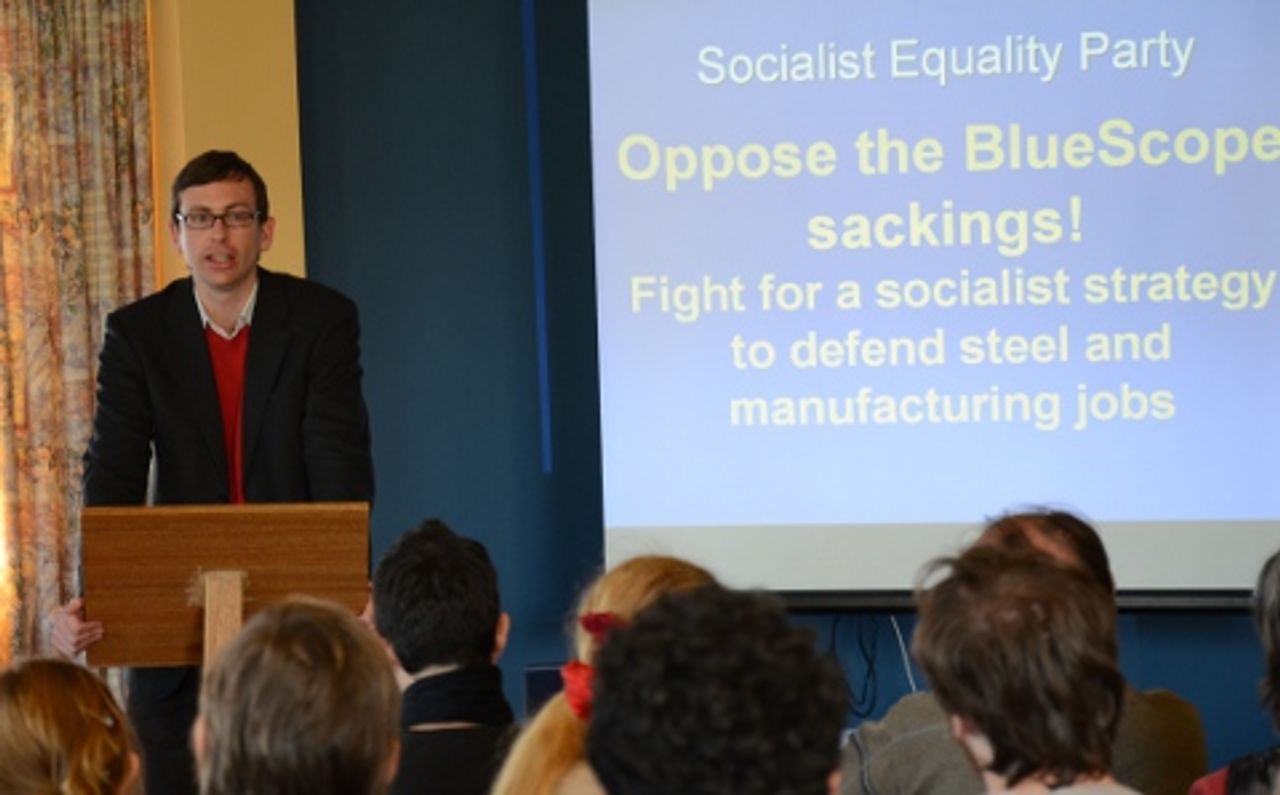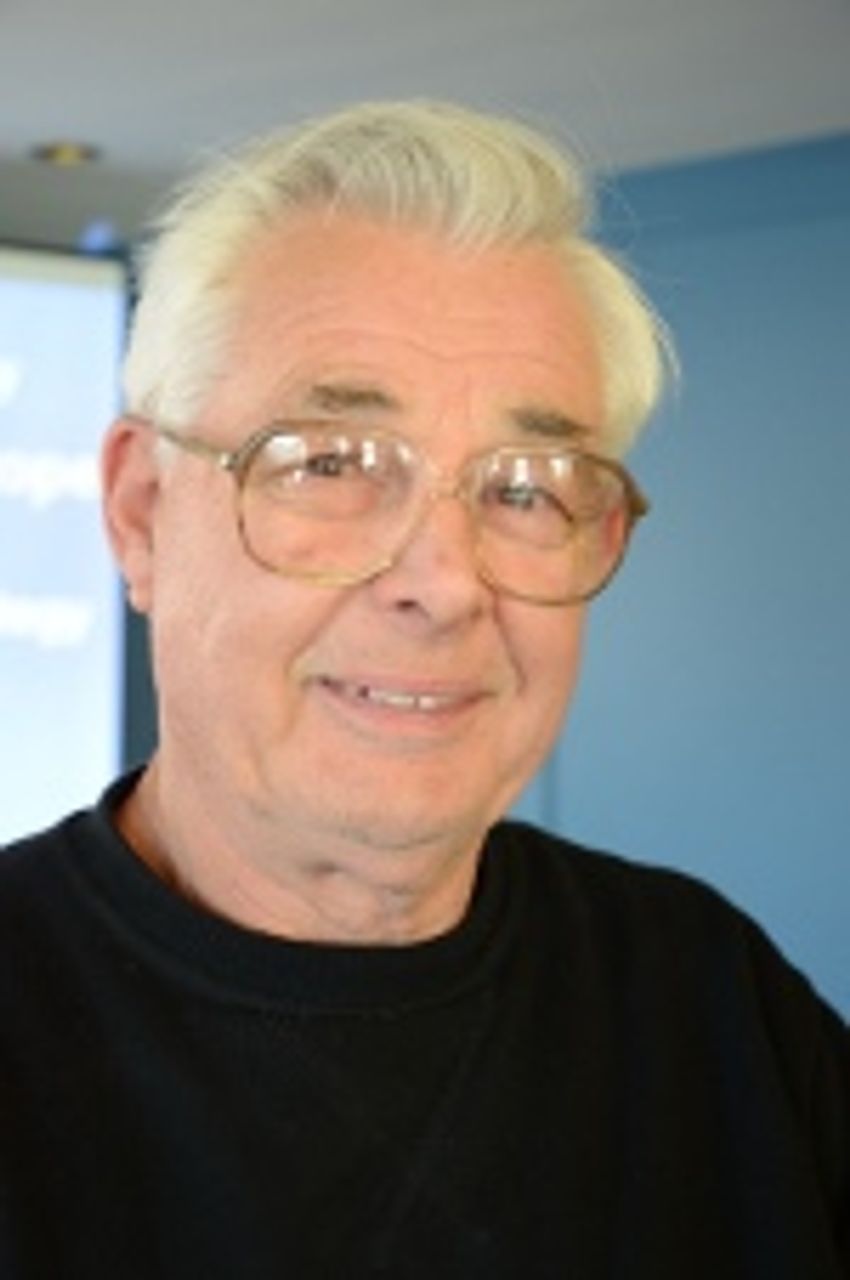The Socialist Equality Party held public meetings in Wollongong, near Sydney, and Hastings, near Melbourne, over the past two weekends to oppose the 1,500 retrenchments being made by BlueScope Steel and to discuss the socialist strategy needed to combat the deepening wider assault on working class conditions, which has seen some 50,000 manufacturing jobs destroyed nationally in six months.
Opening the Wollongong meeting, SEP national committee member Richard Phillips said the response of Prime Minister Julia Gillard’s government and the unions, which had been forewarned of the BlueScope retrenchments, “has been to do everything in their power to ensure that the company’s plans are implemented.”
“The central call of the unions has been to appeal for even great collaboration with the employers than was established under the Hawke and Keating Labor governments from 1983 to 1996. It was during these governments that the working class suffered the most serious assault on its jobs and living standards.
“Under Hawke and Keating, steel jobs at Wollongong’s Port Kembla steelworks were slashed from about 25,000 in the early 1980s to just over 6,000. And since then, with the active support of the unions, steel jobs have been cut to 3,000.” Phillips displayed a graph showing that output had been driven up from approximately 190 tonnes of steel produced per employee per year, to almost 1,750 tonnes.
Will Morrow, a member of the SEP and the International Students for Social Equality, spoke at the Wollongong meeting on the severe jobs crisis confronting young workers. “Youth unemployment around Port Kembla is at 33 percent. Almost all young workers are employed on low pay in the retail and accommodation/services industries. Students and apprentices have to leave the area once they have finished their course in the hope of finding work.
“This state of affairs is a direct result of the destruction of thousands of steel and other manufacturing jobs over the past three decades by the company, working in league with the government and the unions.
“In the 1970s, the steelworks was one of the largest providers of apprenticeships in the area—offering hundreds of positions. Those unable to pursue higher education knew they could get a full-time job and trade... It was not only the steelworks that offered apprenticeships, but smaller companies such as Transfield, EPT and Garnox, which have now closed or moved into other industries.”
Morrow explained that the percentage of youth in casual and part-time jobs in the Illawarra region had shot up from 20 percent in the late 1970s to 67 percent in 2007. He said that the same process was occurring internationally. “In Europe, widespread youth unemployment has led commentators to coin a new term—the ‘lost generation.’ Over the past two and a half years, average youth unemployment in Europe has risen by 25 percent to more than one fifth of people between 15 and 24… In the United States, official youth unemployment is 18.4 percent,” he said.
 Patrick O'Connor addressing Port Kembla meeting
Patrick O'Connor addressing Port Kembla meetingThe main speaker at the meetings, WSWS correspondent and SEP national committee member Patrick O’Connor, explained that the BlueScope sackings were part of a new period of social and political upheaval across the globe, including in Australia, that posed profound political tasks before the international working class.
“Every day brings reports of fresh economic shocks, further market turmoil, and contracting productive activity. This is all symptomatic of a period of capitalist breakdown. What is unfolding confirms that the 2007-2008 financial crash signalled not some temporary or cyclical downturn, but rather marked the end of an entire mode of capital accumulation that had been established in the post-World War II period.”
O’Connor said the BlueScope retrenchments was a major turning point in Australia, exposing the claims that its economy was an “exception” to the global crisis. An onslaught on jobs had been launched by major companies, including Qantas, OneSteel, Westpac and other financial institutions.
“The so-called mining boom has become the mechanism for a sweeping restructuring aimed at boosting the international competitiveness of Australian capitalism... This underscores the irrationality of the entire system—record export prices ought to provide additional revenues for badly underfunded public schools, hospitals, public transport, childcare facilities, public works to create jobs and boost social infrastructure. But of course this is not even raised; instead record profits are siphoned off—BHP Billiton, the former owner of BlueScope, made $22.5 billion last year, Rio Tinto made $7.5 billion in first half of 2010, Xstrata $3 billion.”
O’Connor said steelworkers needed to turn out to other sections of workers under attack, such as at Qantas, in the public sector and the car industry. Old forms of struggle had to be revived, but on a new political basis, independent of the unions. This included occupations of the Port Kembla blast furnace and the Hastings hot-strip mill, which had been targeted for closure. Such a fight would mean a direct struggle against the unions and the Labor government and the development of independent rank and file committees.
The speaker said this required a fight for a workers’ government and the building of a new revolutionary leadership, based on an international socialist strategy. He denounced the anti-Chinese chauvinism promoted by the unions, which sought to tie workers to the Australian ruling elite, and prevent them from unifying their struggles globally. O’Connor pointed out the vast transformation in the global steel industry, which was now dominated by giant corporations, such as ArcelorMittal, which employed 326,000 workers in more than 60 countries and controlled approximately 10 percent of the world’s raw steel production.
“Only the international working class—united on the basis of its common interests in the struggle against the capitalist system—is objectively positioned to resolve the crisis confronting mankind through a fundamental revolutionary organisation of the world economy.” he said.
During the discussion at the Wollongong meeting, a question was asked about how to overcome the resignation that workers had expressed about the sackings, despite their intense anger. O’Connor and other SEP members said workers instinctively recognised that there was no way forward through the old framework of the Labor Party and the unions, but this hostility and disgust had to be translated into an alternative political perspective.
Reiterating the SEP’s call for occupations of the steel plants, speakers warned that the unions would sabotage any such struggle, posing point blank the necessity for a very different movement to emerge, based on new forms of organisation and the building of a revolutionary socialist leadership.
At the Hastings meeting, BlueScope workers said more jobs were being targeted in the plant there than the original 300 mentioned in the media. For workers who remained, there would be a 40 percent reduction in wages through loss of overtime and penalty rates.
Much of the discussion at the Hastings meeting centred on the SEP’s opposition to the unions. A BlueScope worker who has worked at the plant for nearly three decades said that “there might be good and bad” in the unions, but it was necessary to “look at the conditions you’ve got now, and try and build on them”.
O’Connor explained the transformed role of the trade unions with the emergence of globalisation in the late 1970s and 1980s. The unions have worked hand in hand with the corporate elite in Australia and every other advanced capitalist economy to maintain “international competitiveness” by enforcing wage cuts, productivity speedups, and mass job losses.
O’Connor and other SEP members reviewed the role of the unions under the Hawke-Keating government Accords, the gutting of American car workers’ wages by the United Auto Workers union, and other recent workers’ struggles, including the imposition of a 43 percent two-tier wage cut at a PPG Industries paint plant in Melbourne. The unions, O’Connor said, were comprised of an upper-middle class layer, hostile to the social interests of the working class. No struggle in defence of jobs, wages, and conditions could be advanced within the framework of the trade unions.
* * *
 David
DavidInterviewed at the Port Kembla meeting, David, a retired building worker, said he needed time to digest the analysis presented at the meeting, but he was emphatic that the working class “definitely” needed a new political party. “All the political parties are letting us down and we have to change things.”
When David first started work, in 1958, workers were virtually guaranteed jobs in the steel works. “In those days, everybody had a job. About 40,000 workers used to work here in the Port Kembla mill. Blokes came out from Britain and they had jobs ready for them. Those days have gone!”
Asked about the role of the trade unions, he commented: “Years ago, the unions used to keep us together… I don’t know what’s happened but the unions aren’t supporting the workers anymore. Why, I don’t know. The unions have lost the support of the workers. Workers have been stabbed in the back by the unions something dreadful.”
David said it was “essential” for the working class to have a socialist strategy to take power and reorganise society. “I was a big unionist and Labor supporter, but I am not quite sure what is going on now… things are changing. I think we have a struggle in front of us and the time has come.”
 Diana
DianaDiana, a volunteer community worker, said the meeting had given her a clearer understanding of what was behind the retrenchments. “I didn’t realise the global implications outlined at the meeting: the fact that steel jobs are being destroyed worldwide at the same time as steel output and steel productivity is skyrocketing… They’re working people to death and the bottom line is profit.
“Gillard talks about a ‘transition’ but it’s already happening now. People are losing their jobs and those that are in jobs are not being paid their worth. Jobs are being casualised ... Casualisation means that there’s no security, people’s lives are being cut down. It impacts on people’s lives, stress levels, suicide. It has so many social ramifications. Here in Wollongong I’m seeing people suffering whether they work in the steelworks or not.”
 Craig
CraigAfter the Hastings meeting, Craig, a truck driver, commented. “I think breaking with the unions and building a new party is a great idea. Unions were a necessary evil back in the day when they did do things, but now it’s just totally changed. There’s no point having them at all because they don’t do anything for workers.”
“I’m not too happy with Labor either. They’re not for anybody else but themselves and big business. They’re not worried about the workers at all, which is wrong because it’s the worker that’s carrying the country… The unions don’t care about them and the government doesn’t care about them, so we definitely need a party like this to come along to hopefully make a difference and change things for the better.”
The BlueScope worker who had asked the question about the role of the unions said: “The number of jobs going is climbing every day… They’re taking it back to the 1970s, when there was no hot strip mill and the coils came from Port Kembla. The place worked Monday to Friday.
“There were a lot of things I agreed with in the meeting. The two union leaders and Gillard meeting behind closed doors over our future was wrong. What is happening in manufacturing, with Bosch and other companies destroying jobs is very scary. I’ve got relatives in America, I know how bad it is there.”
Subscribe to the IWA-RFC Newsletter
Get email updates on workers’ struggles and a global perspective from the International Workers Alliance of Rank-and-File Committees.
